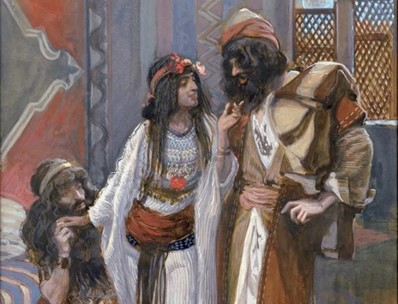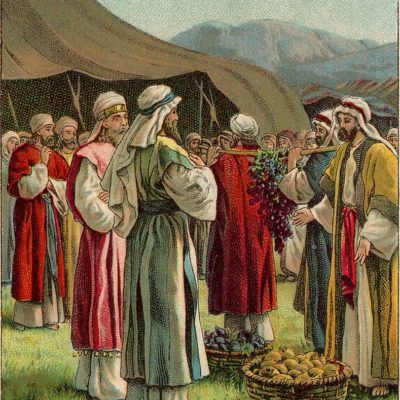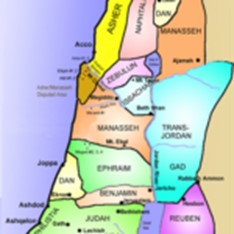Rahab

Rahab had an immoral past, she was a harlot, and had a pagan background. Then her life changed and she is an example of bravery, conviction and hope for all of us who did not have a “pretty perfumed beginning” in our lives.
Joshua 2:1-24, Joshua 6:17-25
Rahab was a harlot in Jericho around 1400 B.C. Joshua, the son of Nun, who took over the leadership of the twelve tribes from Moses into the land of Canaan. Joshua sent out two men to secretly spy on the land of Jericho.
Joshua 2:1 tells us Rahab was a harlot or a prostitute in Jericho. The two spies Joshua sent out lodged in her house. When the king of Jericho heard there were men from the children of Israel lodging with Rahab he sent for Rahab. The king commanded Rahab to send the men out of her house because they came to spy on the country of Jericho.
Rahab hid these two men telling them that they came to her and she would not tell the king where they were. When the king shut the gate so the two men could not escape and tell all they had discovered Rahab took the two men up on the roof of the house, and hid them with the stalks of flax which she had laid in order upon the roof.
Rahab knew that the LORD had given the land to the children of Israel. She knew that her people were afraid of them because they had heard how the LORD had dried up the water of the Red sea for them when they came out of Egypt. They knew what the children had done to the two kings of the Amorites on the other side of Jordan and that Sihon and Og were utterly destroyed. The LORD your God, he is God in heaven above, and in earth beneath.
Here was Rahab who knew the power of the LORD and was convinced she could trust the LORD and these two messengers from the LORD. She asked the two men to swear to her by the LORD that they would save her family and all they had. She asked the men for a true token. It is interesting that she trusted the LORD only after hearing the stories of what He had done in the land of Egypt.
The men answered her in Joshua 2:14; “Our life for yours, if ye utter not this our business. And it shall be, when the LORD hath given us the land, that we will deal kindly and truly with thee.” This was enough for Rahab and she let them down by a cord through the window it was convenient that her house was upon the town wall. Rahab told them to go the mountain and hid there for three day until the pursuers who had been sent out had returned.
Jericho was about 5 miles west of the Jordan River. It would have been a key defense of the Jordan Valley. The eastern gateway to the land would have been a good place to get an overall view of the entire land. The hills where the two spies were told to conceal themselves by Rahab would have been 2.5 miles west of the city. It has been suggested that the house of Rahab was built across the gap between an inner and outer wall. This would explain the phrase “upon the wall” in Joshua 2:15 “Then she let them down by a cord through the window: for her house was upon the town wall, and she dwelt upon the wall.” (Hamlin, 1983).
Not only had Rahab defied the king and not turn the two men over to him she also had trust and faith in an unknown LORD that she had only heard about. She had trust and faith in two men who had entered her country to occupy it. She was truly a courageous woman.
Joshua 6:17-25 tells the city was destroyed and only Rahab, the harlot, lived along with all that was with her in the house. This was because she had hid the two messengers that were sent out. The two young spies did bring out Rahab and her family and left them outside the camp of Israel. They burnt the city with fire and everything what was inside the city. They saved only the silver, and the gold, and the vessels of brass and iron and it was put in the treasure of the house of the LORD.
Joshua saved Rahab, the harlot, and all here household and she dwelled in Israel even unto this day; because she had hid the messengers, which Joshua sent to spy out Jericho. The genealogy of Christ recorded in Matthew 1:5 shows that Rachab is referred to as being the wife of Salmon, who was of the chief prince of the tribe of Judah and conceivably one of the two spies who she had sheltered. She became the mother of Boaz who married Ruth where Obed was born. Obed was the father of Jesse who was the father of King David. (Butler, 2008).
It is important to note that “Rachab” is mentioned once in the Bible and is translated as Rahab, a harlot of Jericho. Rahab faced contempt and ridicule and even disdain and peril from the citizens of Jericho because she was a harlot or prostitute. Because Rahab has been identified with the genealogy of Jesus there are many who like to down play the fact that a sinner was of the ancestors of Jesus.
One of the most important lessons we can learn from Rahab, the harlot, is there is no one who is beyond the reach of the grace of the LORD God. There is no one who is so bad that they cannot be saved by the blood of Jesus Christ. If we as women do not understand anything else we need to understand that there is nothing anyone one of us can do to gain the grace of the LORD God. It is His grace that He gives to whoever He chooses. The ancestral human line of Jesus Christ did not come from a perfect human lineage. Is not the whole human race a harlot? We all need a Savior.
Rahab may have been a harlot in Canaan in the beginning. Once the two spies came she left her former gods and belief and became faithful to the LORD God. Therefore Rahab becomes an example of hope. Rahab confessed her faith to the LORD God when she affirmed that she knew the LORD is the God of heaven above and on earth beneath. (Joshua 2:11). The children of Israel were taught in Deuteronomy 4:39 “Know therefore this day, and lay it to your heart, that the LORD is God in heaven above and on earth beneath; there is no other.”
Hebrews 11:31refers to Rahab this way; “By faith the harlot Rahab perished not with them that believed not, when she had received the spies with peace.” Many who have been faithful in the service of the LORD God knows that sometime there will be attacks and harassment from evil. Just a reminder not to be discouraged when this happens and you are met with opposition from one form or another from evil. It does not mean that your efforts for the LORD God are a failure. It means you have been successful because evil does not attack those who are not hurting evil in some way or the other.
It is a big deal that Rahab is mentioned in the book of Hebrews in chapter 11 which is the faith chapter. She may have been condemned by her fellow Canaanites but her faith was listed among some of the most respected faithful people in the history of time. Faith is the substance of things hoped for, the evidence of things not seen. It is through faith we understand that the worlds were framed by the word of the LORD God, so that things which are seen were not made of things which do appear. (Hebrews 11:1-3).
Rahab stood alone in her faith and is a wonderful example of what it means to be faithful and trusting in an unseen LORD God who gave us Jesus Christ our Lord as a Savior. It is easy to believe in the LORD when everyone around you believes. Yet Rahab stood along apart from her countrymen she did not ask what was right or wrong she just knew and believed and trusted. What a powerful example she is to all of us.
Today it is becoming hazardous to be a true believing faithful Christian. Our society is increasingly separated and confused by what it means to be a true believer. Faith is misunderstood and trust in the LORD is almost unheard of. All over the world there is a great persecution taking place where Christians are being killed just because they are Christians. Some are killed by death others being killed because they are alienated from their own families who do not believe. May the example of Rahab improve our faith, trust and courage in the LORD God.
References:
Butler, J.G. (2008). Vol. Number Twenty-Seven, Heroes: The Biography of Faith (Hebrews 11), Bible Biography Series. Clinton, IA: LBC Publications. p 214.
Hamlin, E.J. (1983). Inheriting the Land: A Commentary on the Book of Joshua, International theological commentary. Grand Rapids, Mich.; Edinburgh: W.B. Eerdmans Pub. Co.; Handsel Press. pages 18-21.
Cite Article Source
MLA Style Citation:
Holstein, Joanne “Rahab:.” Becker Bible Studies Library Feb 2015.< https://guidedbiblestudies.com/?p=2282,>.
APA Style Citation:
Holstein, Joanne (2015, February) “Rahab:.” Becker Bible Studies Library. Retrieved from https://guidedbiblestudies.com/?p=2282,.
Chicago Style Citation:
Holstein, Joanne (2015) “Rahab:.” Becker Bible Studies Library (February), https://guidedbiblestudies.com/?p=2282, (accessed).

